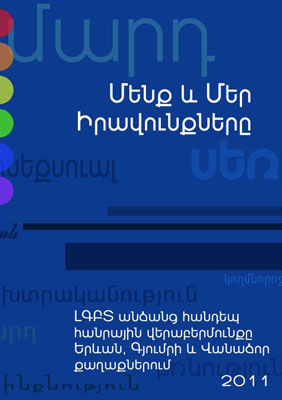According to a recent study conducted in Armenia, 18.6% of respondents view a “non-traditional sexual orientation” as an “illness,” while a whopping 55.3% of respondents would break contact with an acquaintance, friend or relative if they found out he or she was gay.
The joint study by PINK Armenia and Socioscope Societal Research and Consultancy Center looked at public attitudes toward LGBT people in the cities of Yerevan, Gyumri and Vanadzor. Researchers interviewed a total of 1,156 residents, who were divided equally among the three cities.
The findings, presented today by Mamikon Hovsepyan (pictured, right) of Public Information and Need of Knowledge (PINK Armenia) and Arus Harutyunyan (pictured, left) from Socioscope, unfortunately demonstrated a lack of awareness and, according to the report, showed that what respondents knew about LGBT people was largely “stereotypical and outside the scope of scientific explanations.”
A higher number of respondents believed there are “not so many” LGBT people in Armenia (37.2%) as compared to those who responded “yes, they are many” (33.6%), “they are few” (26.7%) and “there are none in general” (2.4%). Out of the three cities, Yerevan respondents more so believed that yes, there are many LGBT people in Armenia (44.6%), while those in Vanadzor had the highest percentage of respondents who believed there were no LGBT people in Armenia at all (5.1%).
As to the distribution of LGBT people between the sexes, a higher percentage of respondents (49.5%) believed that there are more gay men than lesbians in Armenia — except for in Gyumri, where respondents believed there were more lesbians than gay men (49.4% as compared to 28.7% in Gyumri who believe there are more gay men than lesbians).
Study findings report cover
Interestingly, though 9.9% believed that having a “non-traditional sexual orientation” was the result of “online interaction in modern conditions,” in actual fact, more respondents (53.6%) received information about LGBT people from television than any other media. By comparison, only 15% cited the Internet is as a source of information on LGBT matters.
Speaking to Epress.am after today’s press conference, PINK Armenia President Mamikon Hovsepyan was, actually, happy to have these figures.
“I quite liked [this last figure] — it can be used as a fact for when they say that the Internet is spoiling or ruining [our youth, for example] but it turns out that… 53.6% receive information from TV entertainment and news programs, and we know that they are total homophobes there, those programs more so label and ridicule [LGBT people]; on the other hand, only about 10% get LGBT information from the Internet. Consequently, the stereotype that the Internet is damaging completely dissolves,” he said.
Asked about his expectations from the survey findings overall, Hovsepyan said that, delving into the project, he was a bit concerned that public perception upon finding out about the results would be “yes, that’s how it should be.”
“That’s why we emphasized the proposals [at the end of the report]. Perhaps journalists didn’t appreciate these proposals but for a democratic country, they are necessary… to take the right steps so that everyone is protected,” he said.
The proposals Hovsepyan referred to were aimed at government, the Human Rights Defender’s Office, the media, and local and international NGOs. Key proposals include adopting anti-discriminatory legislation and organizing public awareness campaigns.
As to their next steps, Hovsepyan said they would use the findings as the basis for their future work.
“We more so now want to… work with experts to develop guidelines… to develop LGBT rights. For example, we want to do the same work with mass media, how to do this work, what to pay attention to… to work in the area of human rights protection, as well as what needs to be done at the government level. We want to begin work on these guidelines probably by next year,” he said.
Updated 6 pm same day: Added paragraph that begins with “The proposals Hovsepyan referred to…”
 Epress.am News from Armenia
Epress.am News from Armenia
